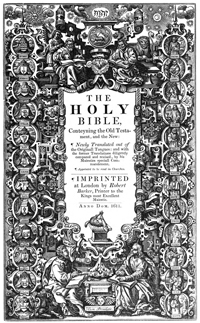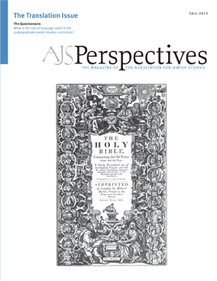
The sundry translations done in the second half of the twentieth century by scholarly-ecclesiastical committees sought to strike out in an entirely new direction, but with lamentable results that made the King James Version still preferable to the new versions. For most Jews, the English Bible that unfortunately has become the default text is the New Jewish Publication Society version, begun in the early 1960s and completed in 1985. The scholarly credentials of the participating translators were impeccable, and I would assume that they had a love for the expressive power of the Hebrew similar to my own. The underlying problem for their enterprise was that, unlike the translators working in early seventeenth-century England, the members of the JPS team were cut off by their cultural location and their academic training from the literary language of the time. When you do a doctorate in Biblical Studies at Harvard or Yale or the University of Pennsylvania, you learn many useful things, from Ugaritic to archeological analysis, but issues of prose style and poetic form will scarcely be addressed in your classes, and you are not likely to be reading James Joyce or Wallace Stevens in your spare time. Thus, the JPS translators, like their Protestant and Catholic counterparts, embarked on a misguided project of repackaging biblical syntax to make it look as though it were composed in the twentieth century, of ignoring the rhythms of both poetry and prose, and of repeatedly stripping away the purposeful ambiguity of Hebrew terms by translating them according to context, in explanatory fashion.
All this was combined with a promiscuous mingling of linguistic registers in English—Joseph distributes "rations" in Egypt, biblical husbands do not lie with their wives but "cohabit" with them. Again and again, the JPS translation exhibits a tin ear for English. Thus, in the first chapter of Genesis: "God made the two great lights, the greater light to dominate the day and the lesser light to dominate the night." The unfortunate choice of "to dominate" not only wrecks the Priestly writer's evocative Hebrew cadence, 'et ha-ma'or ha-gadol le-memshelet ha-yom, but it is also a verb that belongs in the realm of international politics or of sexual perversion, not to the representation of celestial luminaries.
What I think a translator of the Bible should aspire to convey in English is not merely a set of lexical values but the fine articulations of the literary vehicle, for these are inseparable from the vision of God and humanity and history and morality that the biblical writers intended to express. The shaping force of the Hebrew syntax needs to be respected wherever possible—the cadenced sequence of parallel clauses in the narrative prose, the strategic deployment of syntactical inversions used to underscore a thematic point or to highlight an aspect of character. A translator should seek to replicate the subtle, precise, and sometimes daring word choices of the Hebrew and not "regularize" them to look like the choices of an altogether conventional modern English writer. Biblical Hebrew exhibits three general levels of diction: a relatively simple middle diction for the narratives, deliberately limited in vocabulary; a specialized poetic diction for the poetry, reflecting a somewhat archaic language and even distinctive grammatical features; and a diction in the lively dialogues that often gestures toward the colloquial. A translator should at least attempt to show these differences. There is also the vigorous presence of soundplay and wordplay in the Hebrew. Perhaps one should call this the translator's despair because a reasonable English equivalent is often hard to imagine; but, given the expressive importance of such linguistic play in the Hebrew, it is worth trying to devise viable English equivalents. These will often not be attainable, but I can attest that sometimes you get lucky and succeed in conveying something akin to the effect of the Hebrew.
Translating any great work, and perhaps above all the Bible, requires a quality of intellectual humility. All translations are imperfect things, or, from a different point of view, mere works in progress. The imperfections are bound to be especially salient in the case of the Bible because the structure of Biblical Hebrew and the semantic range of many of its terms are so different from those of modern English. I have produced my own versions of biblical texts in the awareness that they are necessarily approximations, sometimes good approximations and sometimes inevitably unsatisfactory ones.
Is this a Jewish enterprise? I would have to say that I am an inveterate literary person and that as such I respond with excitement and wonder to the literary vehicle of the Bible, which I have tried to emulate in English. But that vehicle is for me always indelibly Hebrew, and in this I feel a certain identification, even though I am a translator, with Rashi and Ibn Ezra and all the Jews through the ages who would not have thought of reading the Bible except in Hebrew. My dream, which can be only distantly realized, is to fashion an English Bible that feels like the Hebrew, recovering the earthiness and the precious concreteness of the biblical language, clearing the text of the lingering residue of Protestant theology (the "souls" and the "salvations"), and suggesting to readers what anyone who knows the Hebrew will palpably sense, that this is a kind of writing which indissolubly weds beautiful language with a probing complexity and subtlety of vision.

